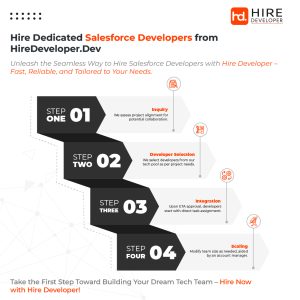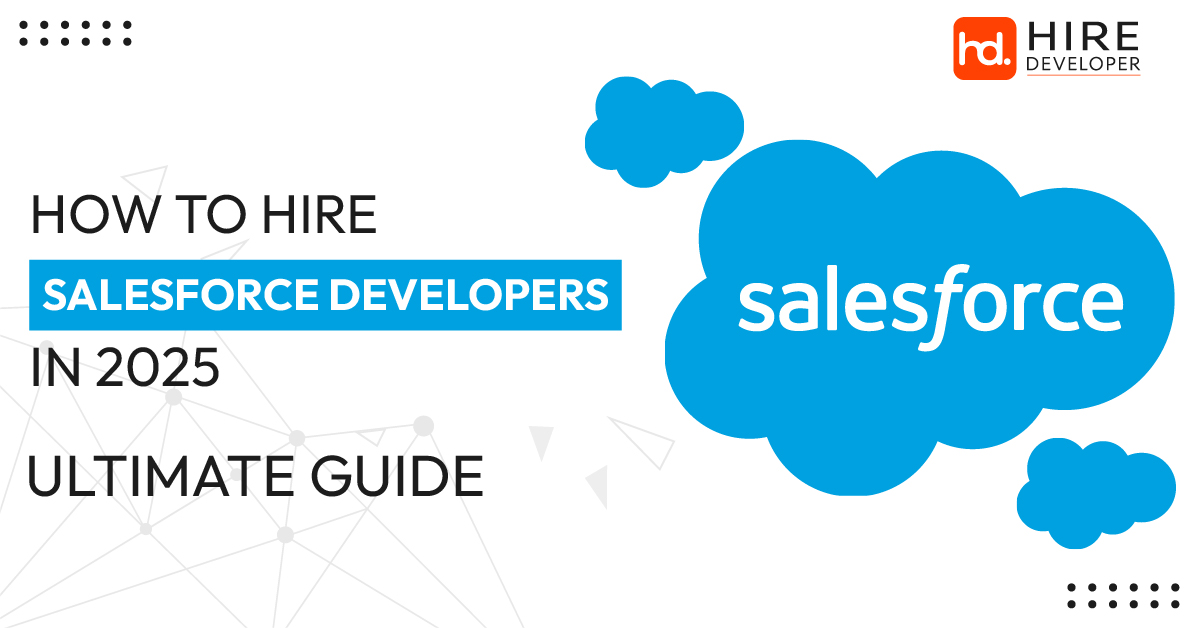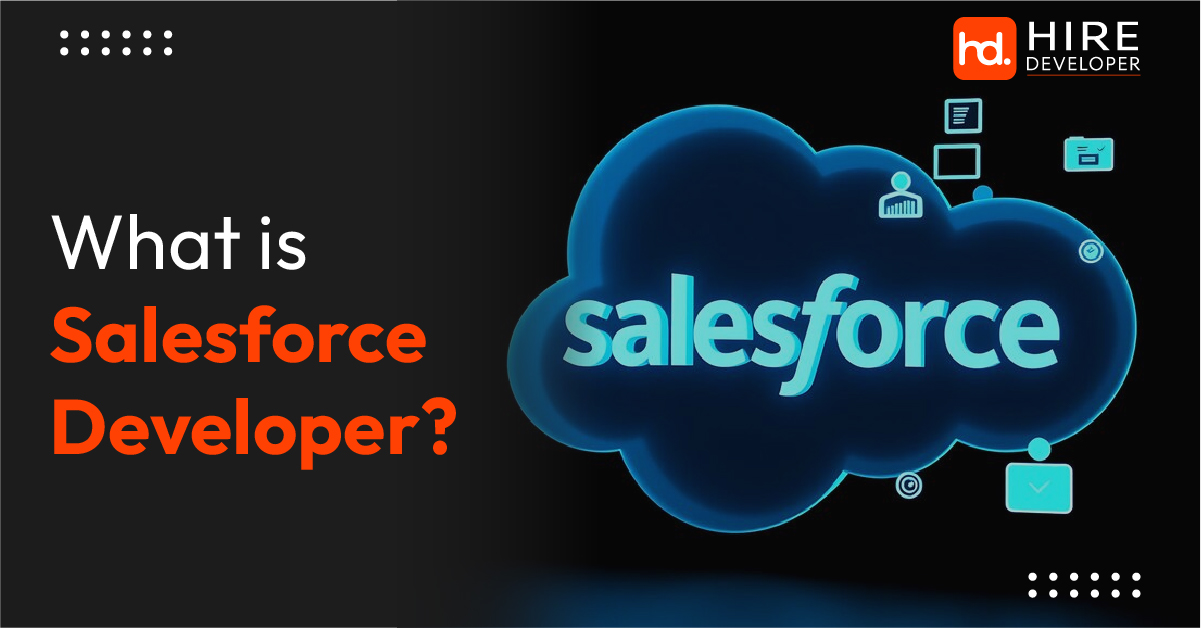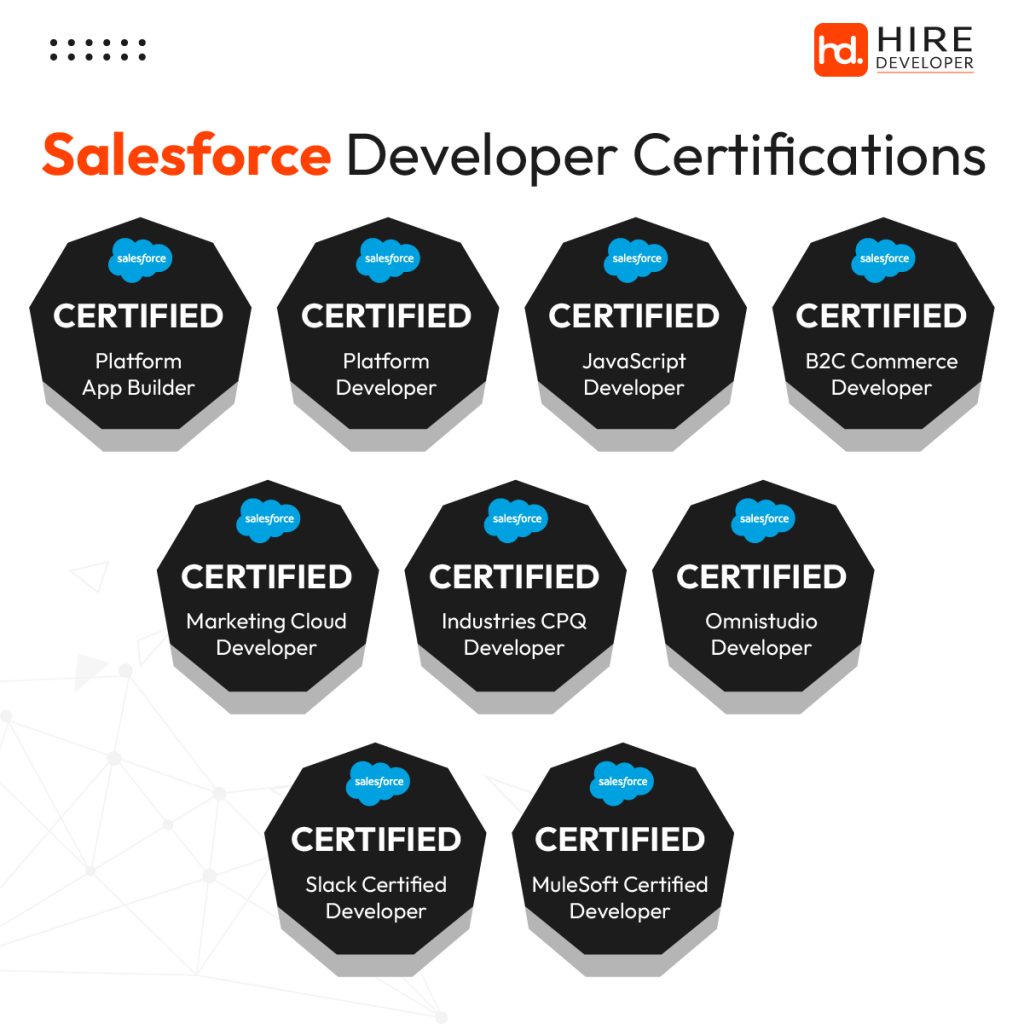In 2025, hiring the right Salesforce developer is more than just filling a tech role it’s about driving your business forward with scalable, cloud-based solutions that create real value. Whether you’re a startup trying to implement your first CRM or a Fortune 500 enterprise scaling automation, the right talent can make or break your Salesforce journey.
This guide offers a people-first approach, backed by real-world experience and industry insights to help you navigate the hiring process confidently and build a team that aligns with your business goals and Salesforce ambitions. You’ll discover how to identify top-tier candidates, avoid common pitfalls, and make informed decisions that lead to sustainable growth and digital transformation. By the end, you’ll be equipped with everything you need to hire Salesforce developers who not only code but also contribute meaningfully to your business success.
What is Salesforce?
Salesforce is the world’s leading cloud-based customer relationship management (CRM) technology, helping businesses build and enhance customer relationships. It was founded in March 1999 by former Oracle executive Marc Benioff, along with Parker Harris, Dave Moellenhoff, and Frank Dominguez in San Francisco. Trusted by startups to Fortune 500 companies, Salesforce offers tools for IT teams, sales, marketing, customer service, and automation all in one unified system. Its flexibility allows teams to personalize customer journeys, streamline operations, and make data-driven decisions. With features like AI-powered insights, mobile access, and seamless integrations, Salesforce empowers businesses to scale with confidence.
Why Salesforce Developers Are in High Demand in 2025
The demand for Salesforce Service Cloud Developers is rapidly increasing as businesses continue to embrace Salesforce for their customer relationship management (CRM) needs. The following key statistics from reputable sources underscore this growing trend:
- According to a study by IDC, the Salesforce ecosystem is projected to create 9.3 million jobs by 2026-27. A significant portion of these roles will focus on development and customization, making Service Cloud Developers highly sought after.
- LinkedIn’s Jobs on the Rise Report highlights Salesforce Developer as one of the fastest-growing job titles, emphasizing the surge in demand for specialized roles such as Service Cloud Developers.
- In 2024-25 alone, Salesforce’s Service Cloud generated $7.58 billion in revenue, reflecting its pivotal role within the company’s product portfolio.
- With a 22% share of the global CRM market, Salesforce maintains a strong leadership position, further fueling the need for skilled developers who can implement and optimize its solutions.
These insights highlight why hiring experienced Salesforce Service Cloud Developers is no longer optional but essential. Their expertise helps organizations unlock the full potential of Salesforce’s capabilities, drive efficiency, and stay ahead in an increasingly competitive landscape.
Understanding the Role of a Salesforce Developer
A Salesforce Developer is responsible for customizing and extending the Salesforce platform to align with an organisation’s unique business needs. Their work goes beyond writing code, they’re solution architects who bridge the gap between technology and business goals. In 2025, as Salesforce becomes more powerful with AI-driven tools, industry clouds, and hyper-automation, the role of a developer has grown more strategic and cross-functional.
Core Responsibilities of a Salesforce Developer:
- Developing Apex code, Lightning components, and Visualforce pages: These are the backbone of custom functionality on the Salesforce platform. Developers use Apex (Salesforce’s proprietary language) to build logic and automation, while Lightning Web Components are used for modern, fast, and dynamic user interfaces.
- Building and integrating APIs: Salesforce often needs to communicate with external platforms like ERPs, marketing tools, and e-commerce systems. Developers design and implement APIs (REST/SOAP) for seamless data exchange and system interoperability.
- Creating custom objects, workflows, and automations: They tailor Salesforce’s architecture to suit specific business requirements, like building objects to store unique data sets or automating sales and service processes to improve efficiency.
- Troubleshooting and maintaining Salesforce environments: Developers ensure performance, security, and stability by identifying and fixing bugs, maintaining version control, and supporting regular platform updates.
- Collaborating with Salesforce Admins, consultants, and end-users: Developers work closely with stakeholders across departments to translate business needs into scalable technical solutions.
Emerging Expectations in 2025:
In 2025, a successful Salesforce developer is more than just a coder. They are expected to:
- Understand business processes: From sales funnels to customer service workflows, developers should grasp the functional context of their builds to ensure the solution drives ROI.
- Stay current with platform innovations: With Salesforce introducing Einstein AI, Flow Orchestrator, and industry-specific clouds (like Financial Services Cloud or Health Cloud), developers must stay ahead with continuous learning and certifications.
- Communicate with clarity: Developers often work with non-technical stakeholders, executives, marketers, sales teams, so strong communication and documentation skills are essential for collaboration.
- Practice secure and scalable development: As businesses collect more data and scale globally, developers are expected to build applications that are not only efficient but also secure and compliant with data protection laws like GDPR and CCPA.
- Contribute to long-term strategy: The best Salesforce developers think beyond code, they assess how solutions will evolve, adapt, and support growth over time.
Why Hire Salesforce Developers?
Hiring experienced Salesforce developers can make a meaningful difference in your CRM strategy and overall business performance. A well-considered Salesforce developer hire ensures your Salesforce solutions are implemented effectively and customized to fit your unique operational needs. By leveraging their specialized skills and practical knowledge, you position your business for long-term success. Here are the key benefits:
- Customized Solutions: Skilled developers tailor Salesforce CRM to match your specific business requirements, enhancing core functionality and solving targeted challenges.
- Seamless Integration: With deep technical understanding, professionals integrate Salesforce smoothly into your existing systems, ensuring a streamlined workflow and accurate data management.
- Enhanced User Experience: Experienced developers optimize the interface and features of Salesforce, creating an intuitive, user-friendly environment that boosts satisfaction and adoption rates.
- Smooth Migration: A strategic Salesforce developer hire ensures a frictionless transition from legacy platforms to Salesforce, reducing downtime and minimizing disruptions to your daily operations.
- Ongoing Support: Trust in reliable, ongoing assistance for troubleshooting, routine maintenance, and updates to keep your Salesforce environment performing at its best.
- Maximized ROI: By applying proven best practices and utilizing advanced Salesforce features, expert developers help you extract more value and drive measurable business growth.
Key Skills to Look for in Salesforce Developers
When hiring dedicated Salesforce developers, it’s essential to thoroughly evaluate their skill set to ensure they can deliver tailored, effective CRM solutions. Key competencies to consider include:
- Apex Programming: Proficiency in Apex enables developers to write custom business logic and implement complex integrations within the Salesforce platform.
- Visualforce: Expertise in Visualforce supports the creation of customized user interfaces and dynamic pages, significantly enhancing the overall user experience.
- Salesforce Lightning: A strong understanding of Salesforce Lightning allows developers to build modern, responsive applications with advanced UI components.
- Integration Capabilities: Skilled developers should be able to seamlessly integrate Salesforce with external systems and applications, enabling efficient data flow and expanded functionality.
- Salesforce API: Experience working with Salesforce APIs is vital for managing integrations, developing custom applications, and facilitating secure data exchanges.
- Data Modeling: The ability to design and manage effective data models is crucial for organizing data in a way that supports business processes and enhances reporting capabilities.
- Problem-Solving: Robust analytical and problem-solving skills help developers troubleshoot technical issues and implement practical, long-term solutions.
- Certification: Holding relevant Salesforce certifications, such as Salesforce Administrator, Developer, or Architect demonstrates a developer’s commitment to professional growth and mastery of the platform.
Evaluating these core skills ensures that you hire Salesforce developers capable of customizing and optimizing the platform to meet your unique business requirements.
Types of Salesforce Developers
Choosing the right Salesforce professional can make a significant difference in the success of your CRM strategy. Whether you’re planning a new Salesforce implementation or looking to optimize an existing setup, it’s essential to understand the various roles within the Salesforce ecosystem. Here’s a clear breakdown of the main types of Salesforce experts and Salesforce consultants, each bringing unique experience and value to the table:
- Salesforce Administrators: Admins manage the configuration and daily operations of your Salesforce environment. They handle user setup, data imports, and create reports and dashboards to keep workflows running smoothly.
- Salesforce Developers: Developers code custom features using Apex and Visualforce and build integrations and automations. They tailor solutions when standard tools aren’t enough.
- Salesforce Consultants: Consultants offer strategic guidance, business analysis, and implementation support. Their role ensures Salesforce aligns with your business goals using industry best practices.
- Salesforce Architects: Architects design scalable, secure Salesforce systems. They focus on high-level architecture, data modelling, and complex integrations to future-proof your platform.
- Salesforce Technical Leads: Technical Leads oversee development teams and manage code quality and timelines. They combine hands-on experience with leadership to drive successful implementation.
- Salesforce Business Analysts: Business Analysts gather and translate business requirements into technical specs. They ensure Salesforce solutions meet user needs and process goals.
Each of these roles brings unique expertise essential to implementing and optimizing Salesforce. Understanding their functions helps you assemble the right team to support your business growth and CRM success.
Step-by-Step: How to Hire the Right Salesforce Developer
Hiring the right Salesforce developer is a pivotal step in shaping a successful CRM strategy and achieving long-term business success. Here’s a step-by-step guide on how to hire a Salesforce developer when working with a company that provides Salesforce development services:
Step 1: Define Your Requirements
Begin by clearly defining your business objectives and the specific technical requirements for your Salesforce project. Consider whether you need certified Salesforce developers for tasks like customization, integration, migration, or ongoing support. It’s also important to outline the scope of the project, expected deliverables, and any required expertise, such as proficiency in Apex, Lightning Components, or Salesforce APIs.
Step 2: Shortlist Potential Companies
Research and identify companies that specialize in Salesforce development. Prioritize firms with a strong reputation, verified experience, positive client feedback, and a portfolio that demonstrates successful delivery of similar projects. This step ensures you’re evaluating candidates based on real-world performance and alignment with your business goals.
Step 3: Evaluate Developer Profiles
After shortlisting companies, assess the individual developer profiles they offer. Review each candidate’s certifications, technical competencies, and hands-on experience with past projects. Pay close attention to developers with a proven track record in handling projects that mirror your business challenges, especially those with expertise in Salesforce API development.
Step 4: Conduct Interviews
Arrange interviews with the shortlisted developers to evaluate their technical capabilities, communication style, and compatibility with your team’s culture. During these conversations, ask about their experience with Salesforce-specific tools, methodologies, and problem-solving strategies. If possible, include a practical assessment or code review to validate their skills in a real-world context.
Step 5: Finalize the Contract
Once you’ve selected the right candidate, proceed to finalize a detailed contract with the hiring company. Make sure to clearly define the scope of work, project timelines, pricing structure, and confidentiality terms. Outline the developer’s roles and responsibilities, project milestones, and expected deliverables to ensure full transparency and accountability.
Step 6: Onboard and Integrate
Initiate the onboarding process by introducing the Salesforce developer to your internal team and providing access to essential tools and resources. Communicate your business processes, project objectives, and success metrics. Maintain regular check-ins and encourage open collaboration to keep the developer aligned with your goals and track progress throughout the engagement.
By following this structured hiring process, you’re not only ensuring technical alignment but also fostering long-term CRM success through a well-executed Salesforce implementation.

Future Trends in Salesforce Development
As Salesforce continues to evolve through 2025 and beyond, staying ahead of emerging trends is crucial for businesses aiming to get the most out of this powerful CRM platform. Understanding where Salesforce development is headed can help teams make smarter decisions, improve user experiences, and drive long-term success. Below are the key trends shaping the future of Salesforce development:
- AI and Machine Learning Integration: Salesforce’s Einstein AI is driving smarter CRM solutions through predictive analytics and intelligent automation. This integration enhances customer experiences by delivering personalized insights and enabling data-driven decision-making.
- Hyperforce and Cloud-Native Solutions: Salesforce’s Hyperforce architecture utilizes public cloud infrastructure to improve scalability, performance, and security. Cloud-native solutions empower businesses to expand globally while maintaining compliance with data residency regulations.
- Low-Code and No-Code Development: Platforms like Salesforce Lightning are empowering users to create applications rapidly with minimal coding. This trend supports faster innovation and allows businesses to adapt efficiently to evolving market demands.
- Enhanced Mobile Experiences: With the continued growth of mobile technology, there is a strong emphasis on developing mobile-responsive Salesforce applications. Hiring Salesforce API developers to optimize interfaces for mobile devices ensures seamless access to Salesforce data on the go.
- Blockchain for Secure Data Sharing: Salesforce’s adoption of blockchain technology is strengthening data sharing security and transparency. This trend is gaining momentum in industries such as finance and healthcare, where secure and verifiable collaboration is crucial.
- Focus on Cybersecurity and Data Privacy: As data security concerns rise, Salesforce development prioritizes robust security measures, including encryption and multi-factor authentication. Ensuring compliance with data privacy regulations remains a top priority for organizations.
- IoT Integration: Integrating Internet of Things (IoT) capabilities into Salesforce enables businesses to collect and analyze real-time data from connected devices. This enhances operational efficiency and improves customer engagement.
- Focus on Sustainability and ESG Initiatives: Salesforce development is increasingly aligned with sustainability and Environmental, Social, and Governance (ESG) goals. Developers are leveraging Salesforce tools to monitor and report ESG metrics, helping businesses meet social responsibility objectives.
By embracing these emerging trends, businesses can remain competitive and maximize their Salesforce investments. Hire an experienced Salesforce developer in India to ensure your organization is well-positioned to capitalize on these advancements effectively.
Cost to Hire a Salesforce Developer in 2025
Get the best offshore Salesforce developer to help you brainstorm, strategize, and implement your business ideas efficiently. The cost to hire an experienced Service Cloud Developer varies based on their expertise, geographical location, and the complexity of your project.
When you hire a Salesforce developer or consultant from HireDeveloper.dev, you can reduce your hiring costs by up to 50%. Choose from our flexible hiring models: Hourly, Part-Time, Full-Time, or Project-Based, designed to suit your business needs and budget.
|
Location |
Hourly Rate |
Full Time Rate |
|
USA |
$70–$150/hr | $120K–$180K/year |
|
India |
$25–$50/hr |
$20K–$40K/year |
|
Eastern Europe |
$35–$65/hr |
$40K–$70K/year |
| Latin America | $30–$60/hr |
$35K–$60K/year |
Why Hire Salesforce Developers from Hire Developer?
Boost your CRM performance and tackle complex business challenges with the help of our experienced Salesforce developers. Hire skilled Salesforce developers in India, the USA, the UK, and worldwide through HireDeveloper.Dev to gain deep technical insight and tailored solutions that ensure seamless integration and help you achieve your business goals efficiently.
Our professionals bring hands-on experience and deliver practical, results-driven solutions.
Why Choose Us:
- Certified Salesforce Developers
- 97% Client Satisfaction Rate
- 2x Faster Project Delivery
- Flexible Hiring Models
- 24/7 Support Availability
- Cost-Effective Solutions
Expertise of Our Salesforce Developers:
Hire dedicated Salesforce developers to craft tailored CRM solutions that align with your business goals. Our seasoned professionals bring deep experience and technical expertise to deliver robust, scalable, and high-performing systems that drive business growth and enhance customer engagement.
We offer comprehensive Salesforce services, including:
- Salesforce Consultation
- Salesforce Customization
- Implementation & Integration
- Salesforce Migration
- Salesforce Support & Maintenance
- Salesforce Cloud Services
- Salesforce App Development
- Salesforce UI/UX Solutions
Collaborate with India’s Top 1% Salesforce Developers — Only at HireDeveloper.Dev
Hiring a Salesforce developer is a powerful decision for any business looking to scale, automate, and innovate. With the right talent, your organization can streamline operations, improve system integrations, and unlock the full potential of the Salesforce platform. Whether you’re aiming to enhance customer experiences, accelerate workflows, or boost data-driven decision-making, experienced Salesforce developers bring the technical expertise and strategic insight to make it happen.
At HireDeveloper.Dev, we connect you with India’s top 1% of Salesforce developers who bring hands-on project experience, advanced technical skills, and strong problem-solving abilities to every engagement. Their capabilities help businesses like yours reduce operational complexity and drive meaningful transformation.
Are you looking to hire dedicated, Salesforce-certified developers or seeking expert support for your CRM initiatives? Hire Developer is recognized as a trusted and renowned Salesforce development partner committed to helping companies maximize ROI through tailored Salesforce solutions.
Hire a Salesforce expert within 48 hours. Need immediate assistance? Secure a top-rated Salesforce developer from our team and begin your project within two days.
Book your free consultation today and explore how our Salesforce talent can elevate your business strategy.


